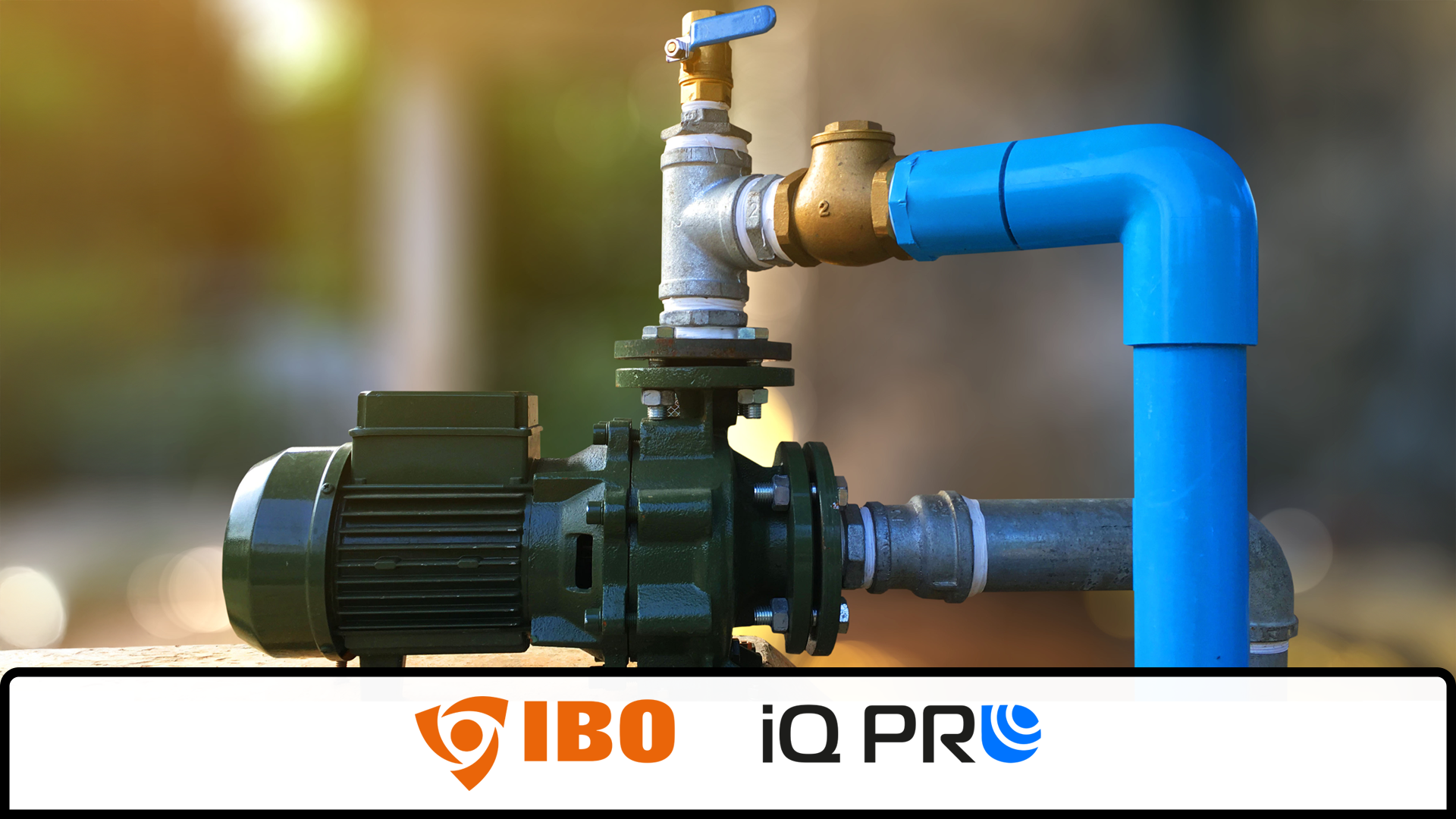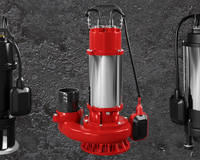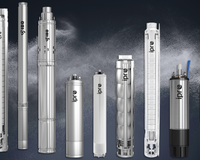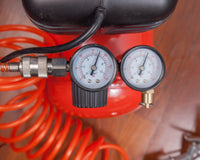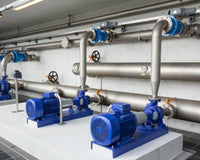Multistage pumps – a modern solution for demanding installations
Multistage pumps are devices increasingly used in homes, agriculture and industry. Thanks to their design, they allow the creation of high water pressure while maintaining energy-saving and quiet operation. They work well wherever a large size is required lifting height and stable pressure - in hydrophore sets, in heating systems, as well as in installations irrigating large gardens or arable fields. For users, this means greater comfort, reliability and operational savings.
Construction of multistage pumps
The most important feature of these devices is the arrangement of several rotors mounted in series on one shaft. Each impeller works in a separate chamber and increases the water pressure by a specific amount. The total effect of all stages allows you to achieve much higher pressure than in single-stage pumps. The casing of multistage pumps is usually made of stainless steel, which ensures corrosion resistance, but cast iron models are also available, designed to operate in more difficult conditions. Depending on the purpose, pumps can be found in a horizontal version, used e.g. in hydrophore sets, and a vertical version - more often chosen in industry and in large circulation systems.
Principle of operation of multistage pumps
The working principle is simple but very effective. Water sucked in through the inlet port goes to the first impeller, where it gains initial pressure. Then it flows through subsequent chambers, and each step increases its energy and pressure. At the outlet it is obtained stable and strong water flow, which is necessary in extensive installations. This design allows for use multistage pumps in systems with high lifting height, while maintaining relatively compact dimensions of the device and quiet operation.
The use of multistage pumps
In single-family houses multistage pumps are mainly used in hydrophore sets. They ensure constant water pressure in the installation, so you can use several draw-off points at the same time - e.g. a shower, a washing machine and a tap in the kitchen - without noticeable pressure drops. They are also ideal for powering automatic garden watering systems, where the water is evenly distributed water flow is crucial for the proper operation of sprinklers.
On farms, multistage pumps operate in large irrigation systems, often on sections several hundred meters long. Their stable pump operation and the opportunity to cooperate with inverters they allow you to maintain optimal pressure in each part of the installation, which translates into even irrigation of crops. Modern models are equipped with thermal protection of the pump and water level sensors, making them resistant to overloads and dry running.
In industrial plants, multistage pumps power production lines where stable water pressure is required for many hours of uninterrupted operation. They are also often used in heating and cooling systems, where they are responsible for the circulation of the working medium. Thanks to their durable construction and the use of high-quality materials, they can operate in difficult conditions for a long time without the need for frequent inspections.
Advantages of multistage pumps
-
High pressure and high lifting height – even in compact models.
-
Quiet and energy-saving operation – modern rotors minimize energy losses.
-
Resistance to difficult conditions – thanks to stainless steel and solid seals.
-
Long service life – with regular service, the pumps can operate for many years.
-
Possibility of cooperation with electronics – inverters and controllers allow for automatic control.
-
Compact dimensions – in relation to the pressure provided.
Multistage and single-stage pumps – comparison
The biggest difference between these devices is the method of generating pressure. Single stage pumps they are simpler in construction and cheaper, but they work mainly in installations with low pressure requirements. Multistage pumps they allow for much higher pressure and better flow stability, which is why they are used in more demanding systems. The choice of a specific solution should depend on the length of the installation, the number of water intake points and the required outlet pressure.
Single-stage pumps – an alternative for less demanding installations
Single stage pumps it is still a popular solution in home water installations, especially where very high pressure is not required. Simple single-stage pump design makes them easy to install and service, and at the same time they are characterized by relatively low purchase costs. The offer includes both single-stage centrifugal pumps, ideal for basic hydrophore applications, as well as single-stage centrifugal pumpsthat ensure stable water flow in garden watering systems. For more specialized needs is also available single stage vacuum pump, used in industry and laboratories.
On our website you will find a wide selection of models - from basic to durable single-stage pumps intended for continuous operation. Worth paying attention to single-stage pumps equipped with modern security features, such as pressure switches and dry-running protection systems. By selecting the right device, you can be sure that the installation will operate reliably and economically for many years.
How to choose the right multistage pump?
The selection of a pump requires the analysis of several basic parameters:
-
Lifting height – determines the maximum distance over which the pump can pump water.
-
Water pressure – it should be stable even when using several receivers at the same time.
-
Source efficiency – the well or tank must provide the appropriate amount of water for the pump.
-
Security – systems protecting against dry running, overload or engine overheating.
-
Possibility of cooperation with inverter and electronic controllers.
It is also worth paying attention to the materials from which the pump is made. Stainless steel models with hygienic certificates are recommended for installations with drinking water, while more resistant cast iron structures are often used in agriculture. In the case of large installations, it is recommended to consult a specialist who will help you select a pump with appropriate parameters.
Example models of multistage pumps
-
IBO WZI 250 – energy-saving horizontal pump, designed for home hydrophore sets. Quiet pump operation and corrosion resistance make it an ideal solution for home and garden installations.
-
IBO MHI – high-pressure pump performance, used in agriculture and industry. Equipped with thermal protection of the pump and solid pump motor, intended for continuous operation.
-
IBO MCI – multistage submersible pump for wells and deep wells. It has built-in check valve and is adapted to work with modern controllers, which increases safety and length pump life.
Frequently asked questions (FAQ)
Are multistage pumps energy efficient?
Yes, modern multistage pumps are designed with energy savings in mind. Thanks to the multi-stage rotor system, they increase the pressure smoothly and without sudden jumps. Combined with inverters, they consume less electricity than traditional single-stage pumps operating in similar conditions. This makes them an economical solution in installations requiring high pressure.
How often should you service a multistage pump?
Service should be performed at least once a year, especially if the pump is operated continuously. During the inspection, it is worth checking the condition of rotors, bearings and seals, as well as inspecting them pump protection. Regular maintenance allows for early detection of possible faults and significantly prolongs life pump life. In industrial installations, service should be performed more frequently.
Can a multistage pump run dry?
No, running dry is very dangerous for any type of pump. Lack of water leads to overheating pump motor and rapid wear of working elements. Therefore, it is recommended to use protection against dry running or electronic controllers that they turn off the pump at the time of decline water level. This is simple protection against costly repairs.
Are multistage pumps suitable for drinking water?
Yes, many modern models are made of stainless steel and materials approved for contact with drinking water. It is important to choose a pump with appropriate certificates. Multistage pumps are eagerly used in home installations and hydrophore sets because they provide constant pressure throughout the network.
Is it worth using an inverter in a multistage pump?
Definitely yes, the inverter allows you to maintain constant water pressure regardless of the current demand. It also limits pressure surges, which protects the installation against water hammer. Additionally, it reduces energy consumption and lengthens pump life, therefore it is recommended especially in systems operating in continuous mode.
Where to buy devices and pumps IPRO?
Our products IPRO you can buy on B2B platform. If you are an end customer, we encourage you to check out ours partner stores and wholesalers. You can also always contact us: +48 22 721 11 92, biuro@dambat.pl.
The information is educational in nature. Please read the product specifications before purchasing. Dambat – manufacturer of IBO pumps.

